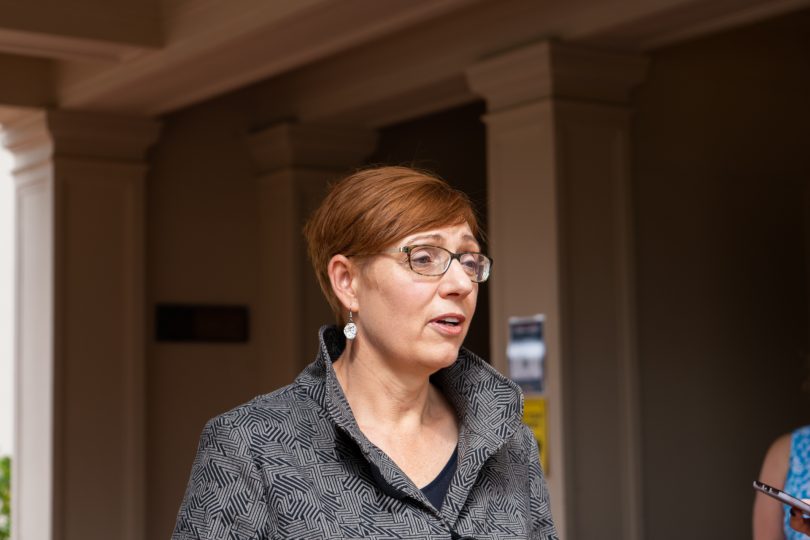
ACT Health Minister Rachel Stephen-Smith said people under-50 will receive the Pfizer jab at the Garran hub. Photo: Dominic Giannini.
Canberrans under the age of 50 will be shepherded towards the Pfizer vaccine at the Garran vaccination hub instead of receiving the AstraZeneca jab after concerns were raised over blood clotting in rare cases.
Health Minister Rachel Stephen-Smith confirmed that people under the age of 50 who are booked into the Garran hub, where both vaccines are administered, will be given the Pfizer vaccine.
The ACT Government is still working out how to manage people under the age of 50 who are booked in to get vaccinated by their GPs who administer the AstraZeneca jab, Ms Stephen-Smith said.
“We will be working through that over the next few days,” she said.
“The [Therapeutic Goods Administration] advice is that it is preferred not to provide AstraZeneca to people under 50 unless the benefit outweighs the risk, and that is a conversation people with underlying health conditions will want to have with their GPs.
“They may choose to go ahead because they see the potential consequences of getting COVID as being more significant than the potential to be subject to this very rare blood-clotting event.”
The change in the vaccine’s rollout came after the Commonwealth Government announced a preference for the Pfizer jab last week following advice from Australia’s vaccine advisory panel.
Rare cases of blood clots have been linked to the AstraZeneca jab around the world, with Australia’s Chief Medical Officer Professor Paul Kelly warning that clots can appear in between four to six cases per million.
Australian medical authorities recommended that people over the age of 50 continue to receive the AstraZeneca jab, with the risk of clotting decreasing with age and the benefits outweighing the risk.
Those under the age of 50 in NSW and ACT will still be able to get the AstraZeneca shot but will be provided with an updated consent form.
Prime Minister Scott Morrison has repeatedly said there is no moratorium or ban on the AstraZeneca vaccine for under-50s, with the advice being a preference for one vaccine over another.
The Commonwealth has ordered an additional 20 million doses of the Pfizer vaccine, doubling the number of Pfizer doses due in Australia by the end of the year. Ms Stephen-Smith said the extra order had not impacted the number of Pfizer vaccines the ACT received over the weekend, with the 3000 doses that arrived being on par with what the Territory expected.
“We continue to hold a stock of Pfizer vaccines and AstraZeneca vaccines to ensure we can smooth out the appointments and the vaccination program here in the ACT,” she said.
“Our primary focus here is to deliver a safe and effective vaccination program that continues to build community confidence. It is really important that we maintain the confidence of the community in getting vaccinated.
“It is our pathway out of the pandemic.”
NSW briefly halted the rollout of the AstraZeneca jab for people under the age of 50 on Friday morning (9 April), but people in this age group will be able to choose whether they have the vaccination from today (Monday, 12 April).
NSW Premier Gladys Berejiklian said it was up to people to assess the risk for themselves and make their own decision.
But the NSW branch of the Australian Medical Association advised doctors in the state against administering the vaccine for people under the age of 50 except in exceptional circumstances.
A pause on the vaccine for people under-50 continues in Victoria while the state works to translate information and consent forms from the Commonwealth into other languages, implement new training for staff to talk about the risks and address indemnity issues that have arisen.
Ms Stephen-Smith denied that there had been inconsistency with the vaccine’s rollout.
“There is consistency in that we are all following the [Australian Technical Advisory Group on Immunisation] and the [Therapeutic Goods Administration’s] advice,” she said.
“The [difference between jurisdictions] is primarily a management issue. The ACT is a small jurisdiction with one ACT Government vaccination hub and the general practices who were making their own arrangements in relation to the appointments they had coming up.
“It made sense for larger jurisdictions to place a pause so they can really understand the appointments they had coming up.”
Officials in the ACT worked overnight to review what appointments they had the next day and move people into the appropriate streams, she said.
For more information about the vaccine’s rollout in the ACT, visit www.covid19.act.gov.au.












